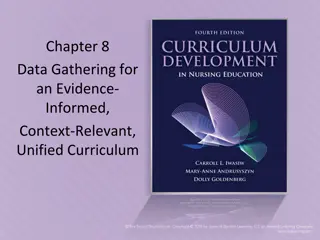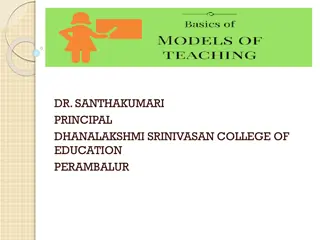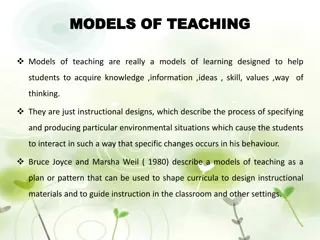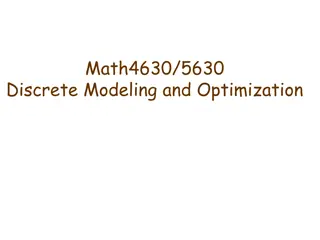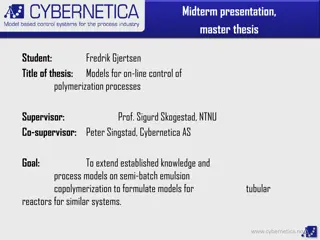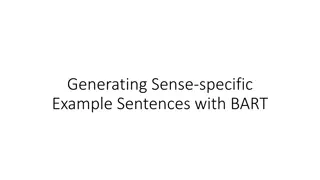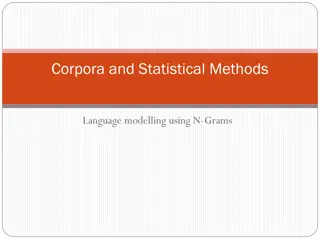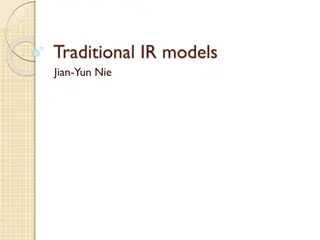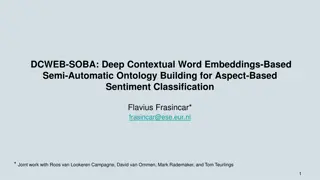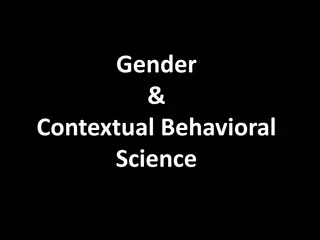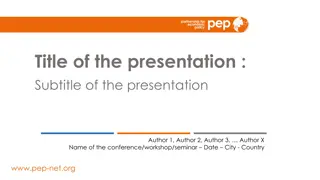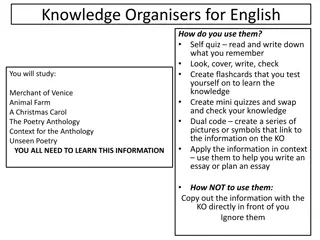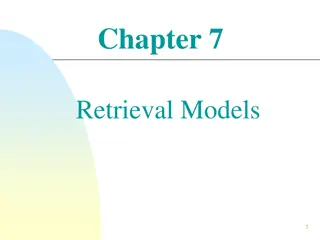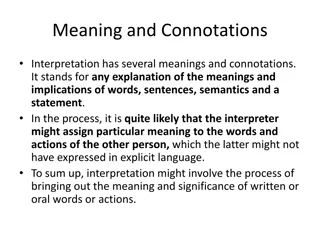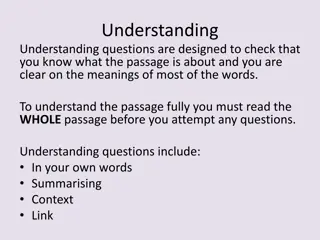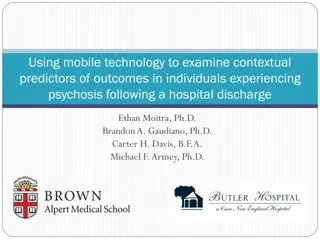Global Climate Models
Scientists simulate the climate system and project future scenarios by observing, measuring, and applying knowledge to computer models. These models represent Earth's surface and atmosphere using mathematical equations, which are converted to computer code. Supercomputers solve these equations to pr
3 views • 15 slides
System Models in Software Engineering: A Comprehensive Overview
System models play a crucial role in software engineering, aiding in understanding system functionality and communicating with customers. They include context models, behavioural models, data models, object models, and more, each offering unique perspectives on the system. Different types of system
3 views • 33 slides
Understanding Input-Output Models in Economics
Input-Output models, pioneered by Wassily Leontief, depict inter-industry relationships within an economy. These models analyze the dependencies between different sectors and have been utilized for studying agricultural production distribution, economic development planning, and impact analysis of i
8 views • 7 slides
Understanding Contextual Factors in Curriculum Development
This chapter delves into the significance of internal and external contextual factors in shaping curriculum development. It discusses the process of gathering essential contextual data, identifying relevant sources, and integrating data to create an evidence-informed, context-relevant, unified curri
5 views • 31 slides
Understanding Models of Teaching in Education
Exploring different models of teaching, such as Carroll's model, Proctor's model, and others, that guide educational activities and environments. These models specify learning outcomes, environmental conditions, performance criteria, and more to shape effective teaching practices. Functions of teach
2 views • 20 slides
Effective Pre-Teaching Vocabulary Strategies for ELs
ELs benefit from specific pre-teaching vocabulary strategies such as selecting important words, providing contextual understanding, offering student-friendly definitions, and engaging in oral interactions. Massachusetts Department of Elementary and Secondary Education emphasizes the importance of ch
2 views • 7 slides
Understanding Models of Teaching for Effective Learning
Models of teaching serve as instructional designs to facilitate students in acquiring knowledge, skills, and values by creating specific learning environments. Bruce Joyce and Marsha Weil classified teaching models into four families: Information Processing Models, Personal Models, Social Interactio
1 views • 28 slides
Understanding Contextual Safeguarding in Multi-Agency Working
This workshop aims to assist multi-agency practitioners in developing Contextual Safeguarding approaches through team activities and discussions. The session covers partnership working outside the home, the ecological approach of Contextual Safeguarding, and an exercise on creating safety in various
0 views • 26 slides
Understanding Discourse Analysis: Formal Links and Contextual Connections
Discourse analysis involves examining language beyond grammar rules, focusing on formal links within sentences and contextual connections outside of language. Guy Cook discusses how formal features shape discourse meaning and how verb forms influence sentence coherence. The use of parallelism in spe
3 views • 22 slides
Significance of Models in Agricultural Geography
Models play a crucial role in various disciplines, including agricultural geography, by offering a simplified and hypothetical representation of complex phenomena. When used correctly, models help in understanding reality and empirical investigations, but misuse can lead to dangerous outcomes. Longm
0 views • 8 slides
Understanding CGE and DSGE Models: A Comparative Analysis
Explore the similarities between Computable General Equilibrium (CGE) models and Dynamic Stochastic General Equilibrium (DSGE) models, their equilibrium concepts, and the use of descriptive equilibria in empirical modeling. Learn how CGE and DSGE models simulate the operation of commodity and factor
4 views • 15 slides
Enhancing Information Retrieval with Augmented Generation Models
Augmented generation models, such as REALM and RAG, integrate retrieval and generation tasks to improve information retrieval processes. These models leverage background knowledge and language models to enhance recall and candidate generation. REALM focuses on concatenation and retrieval operations,
1 views • 9 slides
Understanding Item Response Theory in Measurement Models
Item Response Theory (IRT) is a statistical measurement model used to describe the relationship between responses on a given item and the underlying trait being measured. It allows for indirectly measuring unobservable variables using indicators and provides advantages such as independent ability es
2 views • 32 slides
Understanding Political Theory through a Contextual Approach
Exploring G.H. Sabine's perspective on political theory through a contextual approach, emphasizing the importance of historical context and societal influences. Sabine argues that while political theory evolves with its contemporary politics, it should be analyzed within its specific time and social
0 views • 9 slides
Insights from WJEC A Level English Literature Examiners' Report
Examiners noted candidates' strengths and weaknesses in analyzing poetry pre-1900 and unseen poetry. Candidates lacked confidence in discussing form and contextual influences, but some effectively integrated these aspects. Responses to individual poems were detailed, with contextual focus crucial in
3 views • 18 slides
Understanding Discrete Optimization in Mathematical Modeling
Discrete Optimization is a field of applied mathematics that uses techniques from combinatorics, graph theory, linear programming, and algorithms to solve optimization problems over discrete structures. This involves creating mathematical models, defining objective functions, decision variables, and
0 views • 12 slides
Exploring Contextual Ideas in Frankenstein by Mary Shelley
An analysis of contextual ideas related to the study of Frankenstein by Mary Shelley. Delve into the key connotations, connections with other literary texts, and the enduring resonance of a novel written almost 200 years ago. Understand the significance of the contexts in which literary texts are wr
0 views • 57 slides
Exploring the Similarities Between Goldiamond's Work and CBS Approaches
Israel Goldiamond's work in professional development, ethics, and behavior analysis shows similarities with CBS approaches, emphasizing contextual factors, functional analyses, and long-term goals. Both approaches focus on understanding behavior within its context and promoting positive change throu
3 views • 5 slides
Observational Constraints on Viable f(R) Gravity Models Analysis
Investigating f(R) gravity models by extending the Einstein-Hilbert action with an arbitrary function f(R). Conditions for viable models include positive gravitational constants, stable cosmological perturbations, asymptotic behavior towards the ΛCDM model, stability of late-time de Sitter point, a
1 views • 12 slides
Understanding Wireless Propagation Models: Challenges and Applications
Wireless propagation models play a crucial role in characterizing the wireless channel and understanding how signals are affected by environmental conditions. This article explores the different propagation mechanisms like reflection, diffraction, and scattering, along with the challenges and applic
1 views • 14 slides
Motivating Patients on Smoking Cessation: A Contextual Approach Overview
Explore behavioral interventions for smoking cessation, gain insights into effective brief interventions, and learn to apply them using real-world examples. Understand the challenges in tobacco management in primary care and discover common strategies to support patients in quitting smoking. Embrace
0 views • 19 slides
Models for On-line Control of Polymerization Processes: A Thesis Presentation
This presentation delves into developing models for on-line control of polymerization processes, focusing on reactors for similar systems. The work aims to extend existing knowledge on semi-batch emulsion copolymerization models, with a goal of formulating models for tubular reactors. Strategies, ba
0 views • 16 slides
Generating Sense-specific Example Sentences with BART Approach
This work focuses on generating sense-specific example sentences using BART (Bidirectional and AutoRegressive Transformers) by conditioning on the target word and its contextual representation from another sentence with the desired sense. The approach involves two components: a contextual word encod
0 views • 19 slides
Understanding N-Gram Models in Language Modelling
N-gram models play a crucial role in language modelling by predicting the next word in a sequence based on the probability of previous words. This technology is used in various applications such as word prediction, speech recognition, and spelling correction. By analyzing history and probabilities,
0 views • 101 slides
Understanding Information Retrieval Models and Processes
Delve into the world of information retrieval models with a focus on traditional approaches, main processes like indexing and retrieval, cases of one-term and multi-term queries, and the evolution of IR models from boolean to probabilistic and vector space models. Explore the concept of IR models, r
0 views • 65 slides
Semi-Automatic Ontology Building for Aspect-Based Sentiment Classification
Growing importance of online reviews highlights the need for automation in sentiment mining. Aspect-Based Sentiment Analysis (ABSA) focuses on detecting sentiments expressed in product reviews, with a specific emphasis on sentence-level analysis. The proposed approach, Deep Contextual Word Embedding
0 views • 34 slides
Understanding Gender and Behavioral Science
Exploring the nuances of gender, this content delves into the variance among genders, the impact of gender on behavior, and societal issues related to gender discrimination. It challenges the binary view of gender and highlights the performative spectrum influenced by culture, language, biology, and
0 views • 18 slides
Understanding Cross-Classified Models in Multilevel Modelling
Cross-classified models in multilevel modelling involve non-hierarchical data structures where entities are classified within multiple categories. These models extend traditional nested multilevel models by accounting for complex relationships among data levels. Professor William Browne from the Uni
0 views • 13 slides
Understanding General Equilibrium Models and Social Accounting Matrices
General Equilibrium Models (CGE) and Social Accounting Matrices (SAM) provide a comprehensive framework for analyzing economies and policies. This analysis delves into how CGE models help simulate various economic scenarios and their link to SAM, which serves as a key data input for the models. The
0 views • 50 slides
Policy Implications of Research on Contextual Factors Affecting Urban Development
Explore the impact of contextual factors on urban development, presenting research findings, policy implications, and recommendations. The presentation covers motivations, research questions, methodology, data analysis, and key findings to aid policymakers in enhancing urban planning strategies.
0 views • 12 slides
Study Guide for "Merchant of Venice" - Key Contextual Information and Analysis Points
Explore the key moments and contextual information of "Merchant of Venice" to enhance your understanding of the play. Delve into themes such as patriarchy, money lending, anti-Semitism, and more. Learn about the significant characters and events, along with analysis points to enrich your interpretat
0 views • 12 slides
Understanding Retrieval Models in Information Retrieval
Retrieval models play a crucial role in defining the search process, with various assumptions and ranking algorithms. Relevance, a complex concept, is central to these models, though subject to disagreement. An overview of different retrieval models like Boolean, Vector Space, and Probabilistic Mode
0 views • 56 slides
Unveiling the Art of Interpretation: From Textual Meanings to Contextual Significance
Interpretation delves into the meanings and implications of words, sentences, and classical texts, bringing out their significance. It involves decoding complex ideas, separating temporal and perennial thoughts, and revealing contemporary relevance. Different approaches like textual and contextual a
0 views • 18 slides
Understanding Scientific Models and Their Applications
Explore the world of scientific models through this informative content covering physical, mathematical, and conceptual models. Discover why models are used in science, their types, and potential limitations. Delve into the importance of utilizing models to comprehend complex concepts effectively.
0 views • 21 slides
Techniques for Passage Comprehension
Techniques such as understanding, summarizing, and contextual analysis are essential for effective passage comprehension. In your own words, summarizing key points, and deciphering contextual questions play a vital role in grasping the content fully. By utilizing these methods, you can enhance your
0 views • 46 slides
Understanding Composite Models in Building Complex Systems
Composite models are essential in representing complex entities by combining different types of models, such as resource allocation, transport, and assembly models. Gluing these models together allows for a comprehensive representation of systems like the milk industry, where raw materials are trans
0 views • 27 slides
Contextual GAN for Image Generation from Sketch Constraint
Utilizing contextual GAN, this project aims to automatically generate photographic images from hand-sketched objects. It addresses the challenge of aligning output with free-hand sketches while offering advantages like a unified network for sketch-image understanding. The process involves posing ima
0 views • 21 slides
Contextual Predictors of Psychosis Outcomes Post-Hospital Discharge
This study explores predictors of outcomes in individuals with psychosis post-hospital discharge using mobile technology. It addresses treatment nonadherence, the impact of antipsychotics, psychological flexibility, and the use of ecological momentary assessment (EMA). The research highlights the cr
0 views • 27 slides
Conditional on the Environment? The Contextual Embeddedness of Age, Health, and Socioeconomic Status as Predictors of Remote Work among Older Europeans through the COVID-19 Pandemic
This study delves into how the COVID-19 pandemic has influenced remote work patterns among older Europeans, focusing on the interaction between age, health, socioeconomic status, and contextual factors. It explores the impact of government restrictions, education, income, age, and health on the abil
0 views • 24 slides
Importance of Contextual Lead-Ins in Incorporating Quotes
When incorporating quotes in your SAR or body paragraph, it's crucial to provide a contextual lead-in. This means introducing the quote with a summary derived from the text itself. Examples from Bradbury's work illustrate how contextual lead-ins enhance the understanding and relevance of quoted pass
0 views • 6 slides



